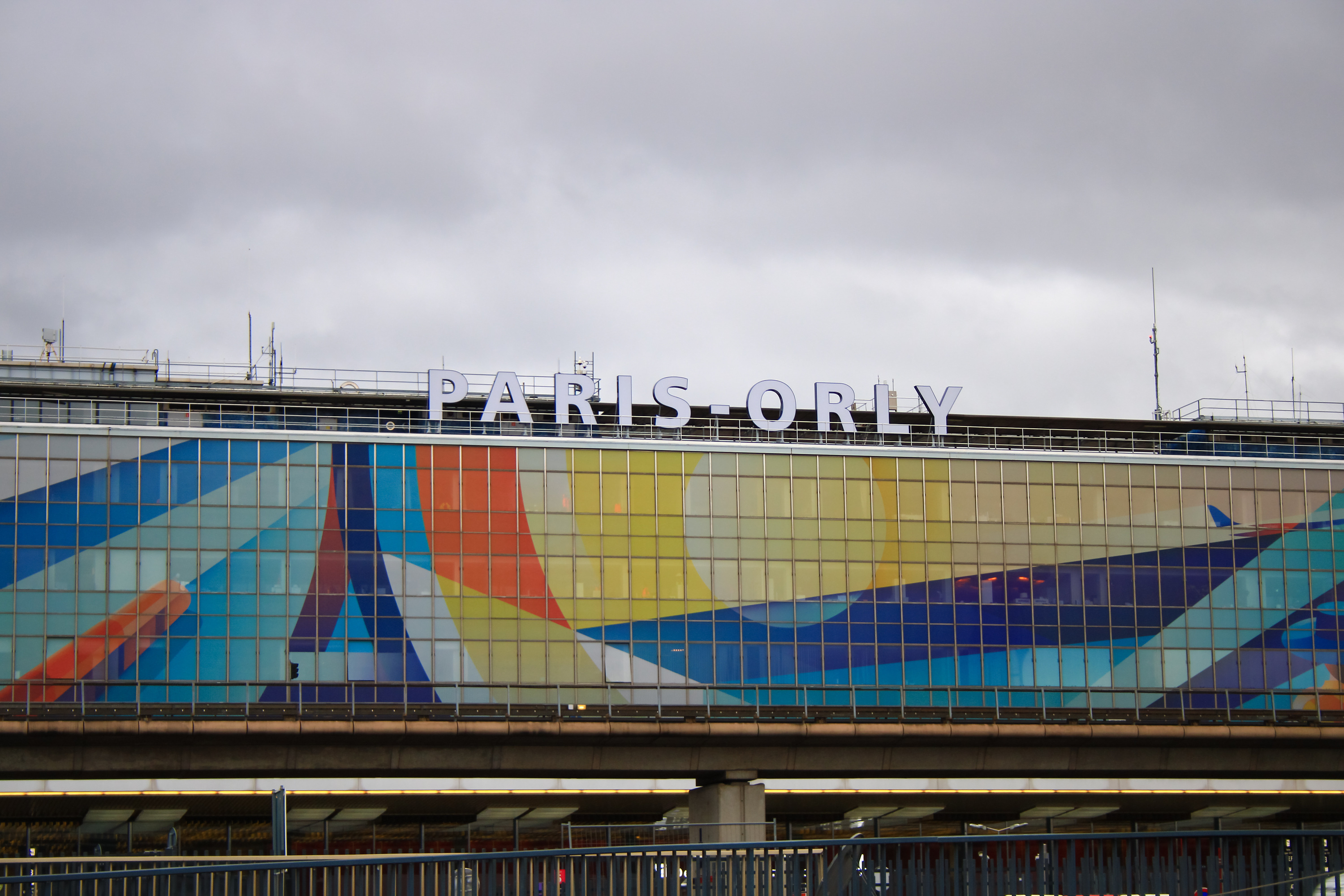Angela Schanelec, in 1962, belongs to the group of film-makers and film-makers that operated in the noughties years of criticism under the name of "Berlin school". Your quiet, focused films beyond all cinematic categories, whether you are musing now in the meditative "Orly" on the transit room of the airport or in "the afternoon," Chekhov is very freely adapted. With their seventh full-length film "I was at home, but" it is represented for the first time in the Berlinale competition. The Premiere is on Tuesday.
woman Schanelec, you have a Professor for narrative Film at the Hochschule für Bildende Künste in Hamburg. There is a lesson that you give to the students at the beginning of the semester?
no, I'm listening for the first time. I try to be assumed by the students, and I can't prevent my attitude to narrative cinema penetrates through.
your own movies require from the spectator an unusual openness of vision. How to convey this to the class?
I think that the students need to trust that there is this openness. I'm not trying to take you to the concern, to meet an expectation in the audience, because this worry is not productive. It brings nothing if you have fear of not being understood.
The title of your film refers to the silent film by Yasujirō Ozu "I was born, but...". Also in the case of Ozu, it is the ratio of children to parents. There are other associations, or of the sound you liked especially?
It is true, I find the title very nice, the restraint and the extent of associations that it evokes. You could make a comparison of the two films in your questions to ask the family to each other, but this need not be, of course, they exist independently of each other.
In the case of Ozu, the family is still reasonably intact, the Film is formed after the death of the father. The relationship of the two brothers to their mother is just as important as the exploration of the space left by the father? Why the father is missing, "I'm home, but" only gradually clear.
Ozu tells how the two brothers do not understand that the father corresponds to the image they have of him. Your desire image collides with reality, and the mother is trying to convey. In my Film, the father no longer lives, he's been a long time since, and, of course, has changed the role of the mother. But his death is not the immediate trigger for the story, and I don't want to suggest also.
The 13-year-old Phillip appears at the beginning of the film, after he was gone for a week, all of a sudden. His Rebellion against the mother and in the school is also an attempt to find yourself as a personality?
I feel Phillip as a very Autonomous, but not in the sense of a wild, unpredictable child. He is, he is, how he must act.
In her last Film, "The fantastic way" to go to the people in the nature. "I was at home, but" returns Phillip from nature, where he has with the animals in the forest lived. Donkey, Dog, Partridge. My first Association was a Nativity play.
I have many thoughts that caused me all the pleasure had in the animals from the Nativity scene on the town musicians of Bremen to fables. There are certain images or scenes, which I then turn not arise in the employment, even if you follow one of the classic dramaturgy. This beginning came to be.
This is a very close access to the cinema. Do you believe that we have forgotten this unreserved See?
Yes, if we could get there eventually, then we have forgotten it. The expectations with which we go to a movie, are complex and not prevent, nevertheless, I find amazing the kind of insult you don't call here, if one supports the very stringent expectations of the narrative cinema. For me, it is much easier to show a Film in the foreign, at best, very far. This is nice, but sometimes it seems to me also strange. If one makes German movies, it has to do with the expectations of the German audience, but also with the expectations of a German Film. This country is on a a, as I slowly understood, very specific stamp, you just have to work around, but the, let's say in Hong Kong lose importance.
Berlinale 2019 - The film in competition, additional images 1 of 25Foto view: By Amesen / Berlinale29.01.2019 09:18The Chinese Director Wang Quan'an returns with "Öndög" in the Mongolian Steppe, where his bear-winner...Back Next
you have worked in the nineties, first as an actress in the theatre. Why have you decided to become a part of the Director and the cinema?
I've very late, as I've already played the theatre, the cinema in the first place discovered and then started to write, and about light to think about settings. The decision to make films that seemed to me at the time as a very deliberate turning away from the Theater, but now I realize how much me, the theatre has influenced. For example, someone with something to report, instead of showing it. Or employment with the rhythm of the language, language.
In "The beautiful way" is hardly ever spoken, "I was at home, but" even more, in a variety of registers. Everyday language, a slightly stylized use of language samples in school the children of "Hamlet". So clearly you have related so far, never on hands-ways of the theatre.
Yes, as I said, language is very interesting to me, and in the context of the waiver. "The fantastic way" is a wordless Film, there was a conscious waiver of dialogues that has me very busy and required me to Rob me of an Agent, and then has the consequence, that my need to write dialogs, is very strong. So there are far more language, and from figure to figure, very different assets, to use the language. The kids speak almost exclusively verses of Shakespeare, are very advanced, so if you want.
To your style means that the actors, their dialogues monotone, almost apathetic voice.
I take That differently. It is to me that the actor with the sets to be doing something. I try to give the actors dialogue, to make something with them, this is what interests me as a spectator.
your movies, the feeling that one is watching you when you Arise often convey. To try to now let's not the concept of the documentary: How to give your scenes this presence?
It comes I think all of what to handle precisely, the space, the movement, the light, the sound, of course, the cut. You don't see what is happening in a setting, I use cutting to manipulate what is really happening in the Moment, but to make ruptures or cracks visible. You can see the Person that exists in front of the camera. Also, I don't expect the actors that you don't have to invent someone who you are.
you have now turned for the fourth Time with Maren Eggert. What makes you so special?
More aboutIn the cinema: "The fantastic way" Through the forest, by the time
Andreas BuscheThat sounds weird, but I find it opaque and translucent at the same time. She is professional and sensitive in equal measure. And the longer I know you, the better I understand what I can you can ask how far we can go.

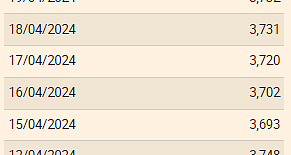 The Euribor today remains at 3.734%
The Euribor today remains at 3.734% Germany: the trial of an AfD leader, accused of chanting a Nazi slogan, resumes this Tuesday
Germany: the trial of an AfD leader, accused of chanting a Nazi slogan, resumes this Tuesday New York: at Columbia University, the anti-Semitic drift of pro-Palestinian demonstrations
New York: at Columbia University, the anti-Semitic drift of pro-Palestinian demonstrations What is Akila, the mission in which the Charles de Gaulle is participating under NATO command?
What is Akila, the mission in which the Charles de Gaulle is participating under NATO command? What High Blood Pressure Does to Your Body (And Why It Should Be Treated)
What High Blood Pressure Does to Your Body (And Why It Should Be Treated) Vaccination in France has progressed in 2023, rejoices Public Health France
Vaccination in France has progressed in 2023, rejoices Public Health France Food additives suspected of promoting cardiovascular diseases
Food additives suspected of promoting cardiovascular diseases “Even morphine doesn’t work”: Léane, 17, victim of the adverse effects of an antibiotic
“Even morphine doesn’t work”: Léane, 17, victim of the adverse effects of an antibiotic MEPs validate reform of EU budgetary rules
MEPs validate reform of EU budgetary rules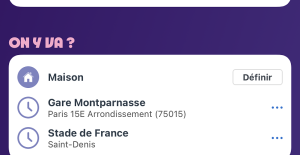 “Public Transport Paris 2024”, the application for Olympic Games spectators, is available
“Public Transport Paris 2024”, the application for Olympic Games spectators, is available Spotify goes green in the first quarter and sees its number of paying subscribers increase
Spotify goes green in the first quarter and sees its number of paying subscribers increase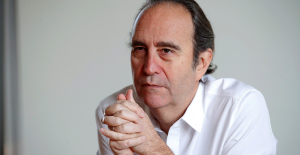 Xavier Niel finalizes the sale of his shares in the Le Monde group to an independent fund
Xavier Niel finalizes the sale of his shares in the Le Monde group to an independent fund Owner of Blondie and Shakira catalogs in favor of $1.5 billion offer
Owner of Blondie and Shakira catalogs in favor of $1.5 billion offer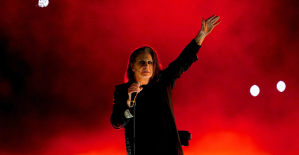 Cher et Ozzy Osbourne rejoignent le Rock and Roll Hall of Fame
Cher et Ozzy Osbourne rejoignent le Rock and Roll Hall of Fame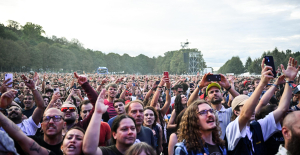 Three months before the Olympic Games, festivals and concert halls fear paying the price
Three months before the Olympic Games, festivals and concert halls fear paying the price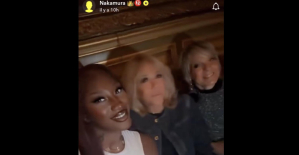 With Brigitte Macron, Aya Nakamura sows new clues about her participation in the Olympics
With Brigitte Macron, Aya Nakamura sows new clues about her participation in the Olympics Skoda Kodiaq 2024: a 'beast' plug-in hybrid SUV
Skoda Kodiaq 2024: a 'beast' plug-in hybrid SUV Tesla launches a new Model Y with 600 km of autonomy at a "more accessible price"
Tesla launches a new Model Y with 600 km of autonomy at a "more accessible price" The 10 best-selling cars in March 2024 in Spain: sales fall due to Easter
The 10 best-selling cars in March 2024 in Spain: sales fall due to Easter A private jet company buys more than 100 flying cars
A private jet company buys more than 100 flying cars This is how housing prices have changed in Spain in the last decade
This is how housing prices have changed in Spain in the last decade The home mortgage firm drops 10% in January and interest soars to 3.46%
The home mortgage firm drops 10% in January and interest soars to 3.46% The jewel of the Rocío de Nagüeles urbanization: a dream villa in Marbella
The jewel of the Rocío de Nagüeles urbanization: a dream villa in Marbella Rental prices grow by 7.3% in February: where does it go up and where does it go down?
Rental prices grow by 7.3% in February: where does it go up and where does it go down? Europeans: “All those who claim that we don’t need Europe are liars”, criticizes Bayrou
Europeans: “All those who claim that we don’t need Europe are liars”, criticizes Bayrou With the promise of a “real burst of authority”, Gabriel Attal provokes the ire of the opposition
With the promise of a “real burst of authority”, Gabriel Attal provokes the ire of the opposition Europeans: the schedule of debates to follow between now and June 9
Europeans: the schedule of debates to follow between now and June 9 Europeans: “In France, there is a left and there is a right,” assures Bellamy
Europeans: “In France, there is a left and there is a right,” assures Bellamy These French cities that will boycott the World Cup in Qatar
These French cities that will boycott the World Cup in Qatar Serie A: Bologna surprises AS Rome in the race for the C1
Serie A: Bologna surprises AS Rome in the race for the C1 Serie A: Marcus Thuram king of Italy, end of the debate for the position of number 9 with the Blues?
Serie A: Marcus Thuram king of Italy, end of the debate for the position of number 9 with the Blues? Milan AC-Inter Milan: Thuram and Pavard impeccable, Hernandez helpless… The tops and flops of the derby
Milan AC-Inter Milan: Thuram and Pavard impeccable, Hernandez helpless… The tops and flops of the derby Ligue 2: Auxerre leader, Bordeaux in crisis, play-offs... 5 questions about an exciting end of the season
Ligue 2: Auxerre leader, Bordeaux in crisis, play-offs... 5 questions about an exciting end of the season






